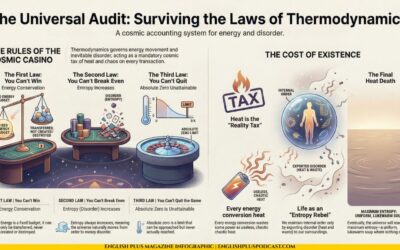Gravitational Waves: Detecting Cosmic Ripples
Imagine tossing a pebble into a pond and watching the ripples spread across the water’s surface. Now imagine that instead of water, you’re looking at spacetime itself—the very fabric of the universe. When massive objects like black holes or neutron stars collide, they create ripples in spacetime, known as gravitational waves. While these waves are invisible to the naked eye, scientists have developed groundbreaking technology to detect them, offering us a new way to observe the universe. But why should this matter to you? Let’s explore what gravitational waves are, how they’re detected, and why they’re essential to understanding the cosmos and even our place within it.
What Are Gravitational Waves?
Gravitational waves are distortions in spacetime caused by the acceleration of massive objects. Albert Einstein first predicted their existence in his theory of general relativity in 1915, suggesting that when large cosmic bodies like black holes collide, they generate ripples that travel across the universe at the speed of light. These waves stretch and squeeze spacetime itself, but because their effects are incredibly subtle, detecting them required extraordinary technological advancements.
In everyday terms, think of gravitational waves like the ripples you see in a calm pond after throwing in a stone. While the waves spread out from the impact, the water itself isn’t moving in large chunks—it’s more of a gentle shift. Similarly, gravitational waves cause a minuscule movement in the very fabric of spacetime, but their effects on us here on Earth are incredibly small—so small that it took over a century to confirm their existence.
How Do We Detect Gravitational Waves?
Detecting gravitational waves was one of the most difficult challenges in modern physics, but in 2015, scientists achieved a historic breakthrough. Using an instrument called LIGO (Laser Interferometer Gravitational-Wave Observatory), they detected the first direct evidence of gravitational waves from the merger of two black holes.
LIGO works by sending laser beams down long tunnels and measuring tiny changes in distance caused by passing gravitational waves. Even though the distortions in spacetime are smaller than the width of a proton, the highly sensitive equipment can pick up these changes. Another observatory, VIRGO, works alongside LIGO, enhancing our ability to pinpoint the sources of these waves.
You can think of LIGO as a pair of ultra-sensitive “ears” listening for the faintest echoes from space. Every time two massive objects, like black holes or neutron stars, collide billions of light-years away, these observatories pick up the gravitational “sound” of that event.
Real-Life Implications: Why Gravitational Waves Matter
You might be wondering how this all relates to your daily life. Understanding gravitational waves may seem like abstract science, but it actually plays a crucial role in expanding our knowledge of the universe. Just as the discovery of electromagnetic waves in the 19th century led to radio, television, and mobile phones, the detection of gravitational waves could lead to innovations we can’t yet imagine.
Moreover, gravitational waves offer a new way to study cosmic events. Previously, astronomers relied on light—whether visible, ultraviolet, or radio waves—to observe space. Now, gravitational waves provide an entirely new lens through which to observe phenomena we couldn’t see before, such as black hole collisions or the behavior of neutron stars. This opens up new possibilities for understanding the universe’s evolution, its structure, and perhaps even its origin.
Think about how many technologies you use today that came from scientific discoveries not directly related to everyday life. GPS, for example, is based on the principles of relativity, a theory that once seemed far removed from practical use. Similarly, studying gravitational waves might seem like “cosmic theory,” but the long-term benefits could be groundbreaking.
The Role of Collaboration in Science
The detection of gravitational waves isn’t just a win for physics—it’s a testament to global collaboration. LIGO and VIRGO’s success relied on scientists working together across borders and sharing data. This kind of cooperation reminds us that the biggest challenges we face—whether in science, technology, or society—often require teamwork on a massive scale.
In everyday life, you can see similar examples of teamwork and shared effort. Whether at work, in a community project, or even in global challenges like climate change, we achieve the greatest outcomes when we come together with a common goal. Gravitational waves teach us that no challenge is too large if we unite in pursuit of a shared vision.
What’s Next for Gravitational Wave Detection?
The field of gravitational wave detection is still in its early stages, but the future is promising. New observatories are being developed to detect waves with even greater sensitivity and over longer periods of time. One such project, LISA (Laser Interferometer Space Antenna), is designed to detect gravitational waves from space rather than from Earth, which will allow scientists to observe events further and deeper in the universe.
In the coming decades, gravitational wave astronomy could reveal insights about the nature of dark matter, the formation of galaxies, and even the structure of time itself. The mysteries of the universe may soon be within our reach, giving us a more complete picture of our place in the cosmos.
What You Can Do
While you may not be working on the next gravitational wave detector, the lesson here is one of curiosity and collaboration. Consider how you can approach your own challenges—whether personal or professional—with the same curiosity and persistence that scientists use when exploring the universe. Be open to collaboration and teamwork, knowing that even the most difficult problems can be solved when we work together.
Stay curious about the universe around you. Follow advancements in space science, and think about how new discoveries might impact the way we live in the future. And next time you look up at the night sky, remember that hidden ripples are passing through spacetime, telling the story of events that happened billions of years ago.
By understanding the significance of gravitational waves, you’ve tapped into one of the universe’s most profound mysteries. How will this new understanding change the way you view your own challenges, and what steps will you take to embrace the unknown?
Expand Your Vocabulary
- Gravitational Waves
- Meaning: Ripples in spacetime caused by the movement of massive objects, such as colliding black holes or neutron stars.
- Everyday Use: Gravitational waves can be thought of as “shockwaves” in life—those big, impactful events that ripple out and change things around us.
- Spacetime
- Meaning: The four-dimensional framework that combines space and time into a single continuum.
- Everyday Use: In a busy schedule, “spacetime” could be seen as how we balance our daily activities, where we try to find the right space and time for everything important.
- General Relativity
- Meaning: Einstein’s theory that explains how gravity works as a warping of spacetime by mass and energy.
- Everyday Use: General relativity reminds us that sometimes what seems like simple force (like pulling someone in with an idea) can have a deeper, more complex impact than we initially realize.
- LIGO (Laser Interferometer Gravitational-Wave Observatory)
- Meaning: An advanced scientific instrument used to detect gravitational waves by measuring tiny distortions in spacetime.
- Everyday Use: LIGO can be likened to the sensitive “radar” we have in our lives—our ability to detect subtle changes in mood or behavior in those around us.
- Neutron Stars
- Meaning: The remnants of massive stars that have exploded as supernovae, consisting mostly of neutrons and incredibly dense.
- Everyday Use: Neutron stars can symbolize someone who has been through great challenges and is now stronger and more focused—dense with experience.
- Black Hole
- Meaning: A region in space where gravity is so strong that nothing, not even light, can escape from it.
- Everyday Use: In everyday life, a “black hole” can refer to something that consumes all your time or energy, like a difficult project or emotional issue.
- Laser Interferometry
- Meaning: A technique used to measure incredibly small distances using lasers, crucial for detecting gravitational waves.
- Everyday Use: Just like laser interferometry measures minute differences, paying attention to small details in life can lead to big discoveries or improvements.
- Cosmic Events
- Meaning: Major occurrences in the universe, such as the collision of black holes or the explosion of stars.
- Everyday Use: Think of cosmic events as major moments in your life—such as starting a new job, moving to a new place, or a personal milestone—that change everything around you.
- Dark Matter
- Meaning: A form of matter that does not emit light or energy, yet makes up most of the universe’s mass.
- Everyday Use: Dark matter can represent the unseen forces in our lives, such as personal motivations or hidden emotions, that drive our actions even if they’re not obvious.
- Collaboration
- Meaning: Working together toward a common goal, often seen in large scientific endeavors like the detection of gravitational waves.
- Everyday Use: Collaboration happens in everyday life when we work with others to achieve something greater than we could on our own, whether in family, work, or community projects.
Let’s Talk
- Gravitational waves are the result of massive collisions far out in space. What kinds of “ripples” have you experienced in your life from significant events? How have those events changed the way you see the world?
- Scientists use incredibly sensitive instruments to detect changes in spacetime that are smaller than the width of a proton. What “tiny details” in your life do you pay attention to that might lead to big insights or changes?
- Just as gravitational waves open a new way of understanding the universe, how can embracing new perspectives or ideas change the way you approach problems in your own life?
- The discovery of gravitational waves took global collaboration and years of persistence. What are some challenges you face that might benefit from collaboration or teamwork with others?
- LIGO and VIRGO have revolutionized how we observe the universe. What technological advances in your lifetime have dramatically changed the way you live, and how do you think future technologies might affect you?
- Dark matter remains one of the biggest mysteries in space. What “invisible” forces—like emotions or social pressures—affect your decisions, and how do you manage those influences?
Use these questions to reflect on the deeper meanings behind scientific discoveries and how they connect to everyday life. Share your thoughts in the comments or discuss with friends and family to explore how cosmic ideas can inspire real-life actions!










0 Comments